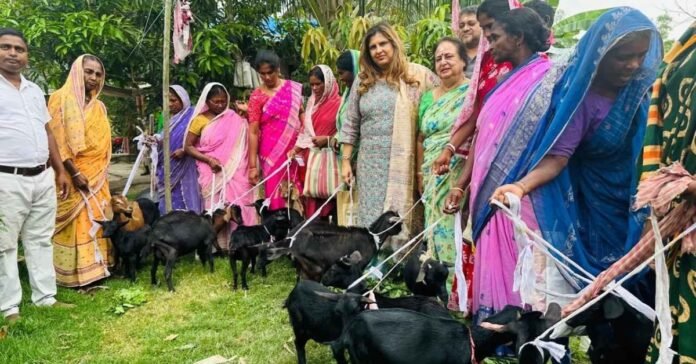
Deep in the tangled green of the Sundarbans — where the rivers breathe mist and the trees have roots like claws — there are two things that rule: tigers and resilience. One kills. The other refuses to die.
This is a story not of tragedy, but of tenacity. Not just of wild beasts and whispered legends, but of women — bold, broken, rebuilding.
And at the center of it all? A woman from Mumbai with a dream and a shovel full of stubbornness.
The Honey That Costs Blood

In most parts of the world, honey is a sweet treat.
In the Sundarbans, it’s a gamble with death.
Men here — the moulis — don’t just gather honey. They battle crocodile-infested waters, mangrove spikes, venomous snakes, and worst of all, the Royal Bengal Tiger. These majestic predators don’t just hunt deer. They hunt humans.
Step into this swampy wilderness, and the rules are clear: You take honey from the forest, the forest may take your life.
That’s not a saying. That’s a statistic.
Over 3,000 women in this region have lost their husbands to tiger attacks. They’re called bagh-bidhobas — tiger widows. It’s a title that comes with pain, stigma, and often, poverty.
“The Tiger or Hunger — What Would You Choose?”

When philanthropist and restaurateur Neeti Goel first visited the Sundarbans in 2022, she came looking to understand. What she found was a brutal choice faced daily by the people here.
“Why do you keep going into the forest when you know it could kill you?” she asked a local honey gatherer.
His answer?
“If I don’t go, we don’t eat. Either the tiger kills us — or hunger does.”
Those words lit a fire in her that hasn’t gone out.
The Beast Beneath the Water
The tigers here aren’t like the ones you see in documentaries. These are swimmers, stalkers of the sea. With webbed paws and saltwater-soaked stripes, they cross rivers like roads. They hunt in silence and strike with precision.
One tiger was seen swimming across the delta faster than any human could manage. They aren’t just apex predators. They’re nightmares with fur.
And yet, the people stay.
Because behind every jungle venture is a hungry family, a child to clothe, a loan to repay.
But when a man doesn’t return by sunset, the village lights a candle and prepares for mourning.
From Widow to Warrior: Enter Neeti Goel

Neeti didn’t come to hand out sympathy. She came to hand over shovels.
“I won’t spoon-feed you,” she told the widows. “But if you want to earn, I’ll show you how.”
And so, they started digging.
Literally.
In front of their homes, 100 women began to carve out fish ponds. With bamboo pipes and a crash course in aquaculture, they turned swampy patches into self-sustaining micro-businesses.
In just four months, the fish were thriving.
Today, those same fish are plated at five-star hotels. But more importantly, they’re feeding children. They’re paying for schoolbooks. They’re restoring dignity.
One Pond, One Phoenix
Take Souravi Mandal.
She lost her husband and son to a tiger. Then her daughter to a crocodile. It was as if the Sundarbans had swallowed her entire family.
But today? Souravi stands by the pond in front of her home with a quiet pride that roars louder than any beast. She earns ₹150 a day. She smiles again. She matters again.
And she’s just one of nearly 500 women Neeti has helped rise from the ashes.
From the Delta to the Dusty Heartland

Neeti’s mission didn’t stop at the edge of the Sundarbans. Her battle for dignity rolled into Uttar Pradesh, Madhya Pradesh, and beyond.
- In Mirzapur, where Naxalism kept girls from school, she gave them bicycles to pedal toward education.
- For sex workers and domestic abuse survivors, she launched micro-businesses: papad stalls, vegetable carts, sewing units.
- When Shabana’s husband sold her only rickshaw for booze, Neeti didn’t just buy her a new one — she bought her an e-rickshaw, turning her into a boss and a breadwinner.

During the pandemic, when most were stuck indoors, Neeti co-led Khaanachahiye, delivering 80 lakh meals to migrants and the homeless.
A Quote to Remember
“Women don’t need to be empowered. They are empowered.
They just need opportunity.”
– Neeti Goel
This belief isn’t a slogan for her. It’s a system. A way of doing things. It’s digging ponds instead of writing cheques. It’s rewriting tragedy into triumph — one woman, one story at a time.
The Final Word: Hope Has Webbed Feet Too
The Sundarbans is still dangerous. The tigers still swim. The forest still watches.
But now, there’s something else taking root here. Not just mangroves — but hope.
The kind that wears a widow’s sari, carries a bamboo pipe, and isn’t afraid of the dark anymore.
From fear to fish farms.
From prey to providers.
From loss to legacy.
The women of the Sundarbans aren’t just surviving anymore.
They’re rising.

